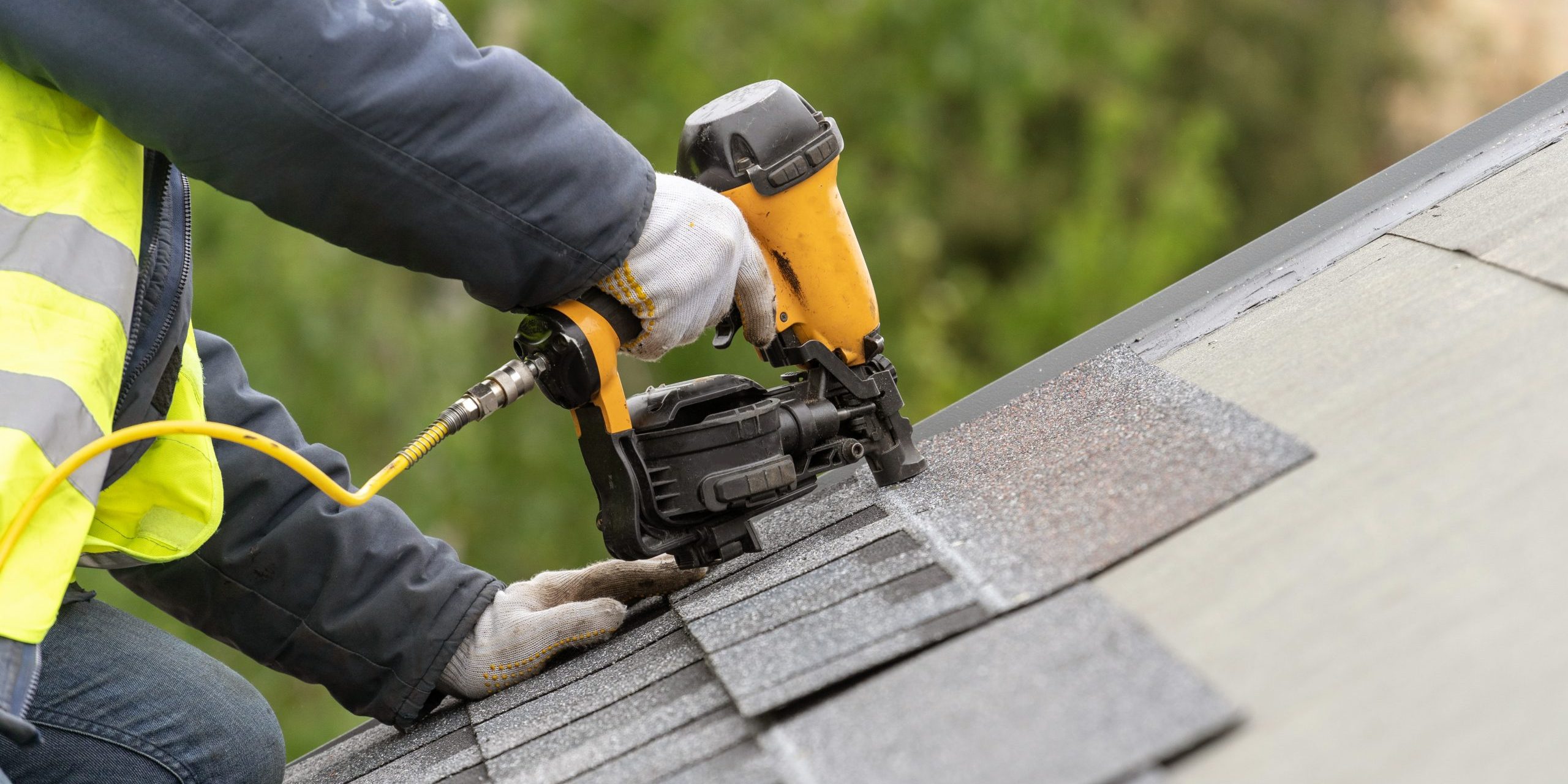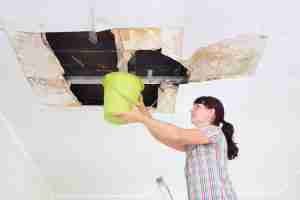Dealing with a leaky roof can be a stressful experience, but taking the right steps can help minimize damage and ensure that your Bergen County, NJ, home stays safe and secure. The first step is to identify the source of the leak, which may require climbing onto the roof or inspecting the attic. When dealing with a leak, it’s important to take safety precautions, such as wearing appropriate gear and avoiding slippery areas.
Temporary fixes, such as using tarps or sealants, can help stop the leak until a professional Bergen County, NJ, roof repair contractor arrives. It’s crucial not to wait too long to get professional assistance, as delaying repairs can lead to more extensive damage and higher costs.
Choosing a reputable roofing contractor such as Expert Roofing of Bergen County, is essential for getting quality work done. You can expect some noise and disruption during a repair or replacement, but a good roofing contractor will work efficiently and keep you informed throughout the process. Preparing for a roof leak repair or replacement includes clearing the area around your home and making sure any pets are secured or removed from the premises.
Preventative measures such as regular maintenance and inspections can help avoid future leaks. It’s also important not to ignore even small leaks or signs of damage, as they can quickly escalate into bigger problems. Insurance coverage for roof repairs or replacement varies depending on your policy, so it’s important to understand what is covered.
DIY repairs may seem like a cost-effective option, but they can be dangerous and lead to further damage if done incorrectly. Hiring a professional roofing contractor in Bergen County, NJ is always recommended to ensure quality workmanship and long-lasting results.
Below are some steps you can take to address a leaking roof:
 Locate the source of the leak
Locate the source of the leak
Roof leaks can be tricky to locate, but it is important to find the source of the problem as soon as possible. Look for any visible signs of water damage, such as water stains or wet spots on your ceiling or walls. You may also be able to trace the leak back to a specific area on your roof.
Contain the water
Once you have found the source of the leak, it is important to contain the water to prevent further damage to your home. Use a bucket or other container to catch any water that is coming through the ceiling or wall. You can also use towels or a mop to soak up any excess water.
Call a roof leak repair professional.
While it may be tempting to try to fix the leak yourself, it is often best to call in a professional. A roofing contractor can assess the damage and provide you with a repair estimate. They will also have the necessary tools and expertise to repair your roof safely.
Make temporary repairs
If you are unable to get a professional to repair your roof immediately, you can make temporary repairs to prevent any further water damage. Cover the leak with a tarp or plastic sheeting to keep the water from entering your home. You can also use roofing cement or tape to seal any cracks or leaks in your roof.
Document the damage
It is important to document any damage caused by the leak for insurance purposes. Take photos of the affected areas, and keep all receipts for repairs and any other expenses related to the leak.
Roof Leaks FAQs
What causes a roof to leak?
There are several potential causes of a roof leak, including:
- Damaged or missing shingles: If the shingles on your roof are cracked, curled, or missing, water can seep through and cause leaks.
- Clogged gutters: If your gutters are clogged with debris, water can overflow and seep under the roof eaves, causing leaks.
- Damaged flashing: Flashing is the metal material that seals seams and joints on a roof. If it becomes damaged or loosened, water can seep through and cause leaks.
- Poor installation: If your roof was not installed properly, it may be prone to leaks from the start.
- Age: Over time, roofs can become worn and weathered, leading to cracks and other damage that can cause leaks.
How can you tell where a roof leak is coming from?
To determine the source of a roof leak, it’s important first to locate the area where water is entering your home. Some common signs of a roof leak include water stains on walls or ceilings, dampness or moldy odors in the attic, or visible water dripping from the ceiling. Once you have identified the leak’s general location, you can investigate further by checking for damage or wear and tear in that area of your roof. Look for missing or damaged shingles, cracks or gaps around chimneys or vents, and damaged flashing. It may also be helpful to inspect your roof during a rainstorm to see if you can identify any areas where water is coming through. If you are unable to locate the source of the leak on your own, it may be best to consult with a professional roofing contractor who can help diagnose and repair the issue.
Can a roof leak be fixed from the inside?
In some cases, fixing a roof leak from the inside may be possible, but it depends on the cause and location of the leak. If the leak is caused by a damaged or missing shingle or tile, it may be possible to access and repair the area from inside the attic or crawlspace. However, if the leak is due to more significant damage, such as a hole in the roof or a damaged flashing, it may be necessary to repair or replace the affected area from outside. It is important to properly diagnose the cause of any roof leaks and address them promptly to prevent further damage to your home.
Will my roof collapse from a leak?
A leaky roof can certainly be a cause for concern, but it is unlikely to cause your roof to collapse on its own. However, if the leak is left unchecked and the water damage continues to accumulate over time, it could potentially weaken the structural integrity of your roof and lead to more serious issues down the line. It is important to address any leaks as soon as possible by identifying the source of the problem and making necessary repairs or replacements.
How long does it take for the ceiling to collapse after a leak?
The time it takes for a ceiling to collapse after a leak will depend on various factors such as the severity of the leak, the size and material of the ceiling, and other environmental conditions. It is best to consult with a professional or experienced contractor who can assess the situation and provide a more accurate timeline for repair or replacement. In general, it’s important to address any leaks in your home as soon as possible to prevent further damage and potential safety hazards.
How long should I wait before I call a roofing contractor if my roof leaks? – It is important to address a leaking roof as soon as possible, as even small leaks can lead to significant damage over time. You should call a roofing contractor as soon as you notice a leak in your roof, rather than waiting for it to get worse. A roofing contractor can assess the extent of the damage and recommend the best course of action, whether it involves repairing or replacing the roof. It’s better to be safe than sorry – addressing a leak early on can save you time, money, and stress in the long run.
How much will it cost to fix a leaky roof?
The cost of repairing a leaky roof can vary greatly depending on the severity of the damage, the size and pitch of the roof, and the type of roofing material used. It is best to consult with a professional roofing contractor who can assess the damage and provide you with an accurate cost estimate based on your specific situation. They can also advise you on any necessary repairs or replacement options to ensure that your roof is properly maintained and protected from future leaks.
Dealing with a leaky roof can be stressful, but taking immediate action and calling in a professional roof leak repair contractor in Bergen County, NJ, can help prevent further damage and ultimately save you money in the long run. Remember to document any damage for insurance purposes and make temporary repairs if necessary.
Call Expert Roofing of Bergen County today at (201) 225-8189 for a free assessment, or fill out our contact form.



 Locate the source of the leak
Locate the source of the leak